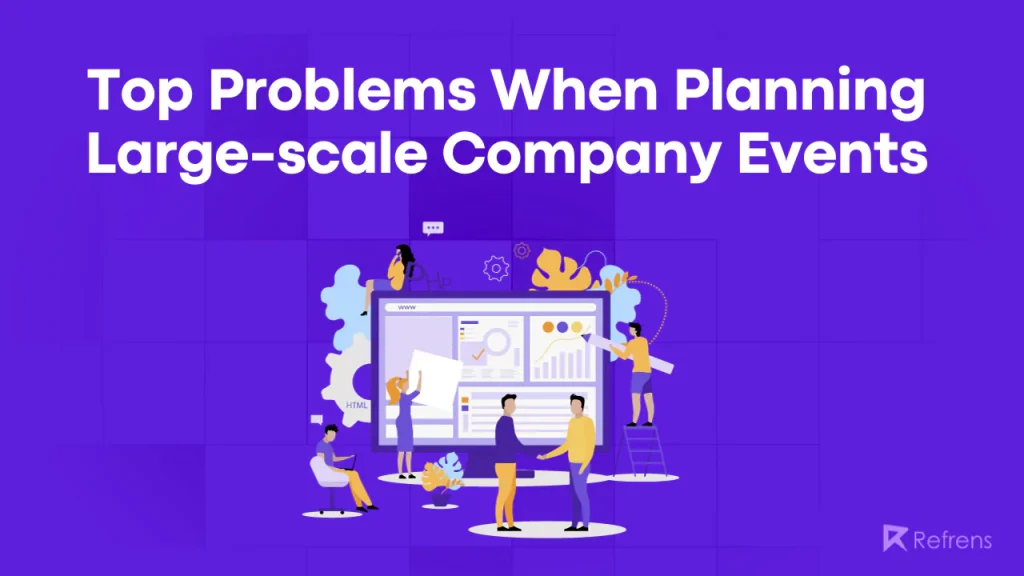Planning a large-scale company event can feel like tackling a beast, especially when unexpected problems arise. Among the most glaring issues, understaffing and overspending feel like the biggest ones to tackle, however, there’s more than just those.
This article will help you identify the top challenges in planning sizeable corporate events and provide proven strategies to overcome them.
Let’s set your next business gathering up for success!
Common Challenges When Planning Large-scale Company Events
Planning large-scale company events comes with the usual stress and complexity of trying to get everything perfect. It rarely ever happens, but there are several stumping-a-wall moments that any organization can relate to.
1. Budget Constraints
Budget constraints pose a significant challenge in planning large-scale company events. A restricted fund limits the scope and scale of the event, making it hard to meet objectives and offer a high-quality experience.
Without precise budget management, overspending leads to additional problems down the line. For instance, an understaffed team negatively impacts the execution and success of any venture due to financial limitations.
Similarly, a limited marketing budget can curtail your promotional efforts, resulting in low attendance numbers at your event.
Moreover, an insufficient budget may deter top-notch speakers or entertainment from participating, affecting the overall quality and appeal of the event.
Budgetary constraints can also limit the tools and resources available for event promotion, further dampening potential attendees’ enthusiasm and participation.
2. Venue Availability
Securing the right venue can quickly become a major stumbling block in planning large-scale company events. Common challenges include finding a space vast enough to accommodate attendees comfortably and guaranteeing it’s available on the desired date.
Peak seasons can often throw curveballs at planners due to the high demand for popular venues, making finding the perfect event location more difficult.
Not only does venue accessibility factor into attendee convenience, but it also impacts overall event security. An appropriate venue security plan significantly contributes to ensuring safety at your corporate gathering.
Streamlining event spaces and services is an effective strategy for overcoming these hurdles, allowing you to manage even the largest gatherings successfully with adequate preparation and proper forethought.
Furthermore, collaborating with local businesses and suppliers can also open doors to potential partnerships and discounts, helping planners maximize the value they get for their budget.
When venue options are limited, considering alternative spaces like outdoor locations, warehouses, or collaborating with neighboring venues can offer unique and memorable solutions
3. Last-Minute Changes
Last-minute changes can throw the best-laid plans into disarray. Picture this: you’ve secured an impressive venue and meticulously planned a top-notch presentation with stunning event CAD imports, but then, out of nowhere – a distinguished guest drops out, or the venue is suddenly unavailable.
These unexpected modifications are not just stress-inducing alterations; they hurt event outcomes too. Staying within budget becomes even more challenging when these curveballs come into play, forcing event planners to re-strategize hastily.
To prevent potential chaos during large-scale events, managing security effectively and minimizing risks associated with sudden changes is crucial.
It all boils down to effective communication and coordination between your team members and stakeholders to handle last-minute surprises smoothly. Maintaining a robust communication platform or tool, regularly updating attendees about any modifications, and having a dedicated team or individual to manage these communications can make a world of difference.
This ensures everyone is on the same page, reducing confusion and frustration.
4. Time Management
Efficient time management is crucial when planning large-scale company events. With limited time availability and many tasks to juggle, it’s easy to feel overwhelmed and need help with meeting deadlines. Utilizing event planner templates can streamline the planning process and assist in organizing tasks effectively.
Event planners often face the challenge of balancing their workload while ensuring that every aspect of the event is well-organized. Moreover, low motivation and procrastination tendencies can further hinder effective event planning.
To overcome these challenges, it is essential to prioritize tasks, set clear timelines, and delegate responsibilities whenever possible. By managing time effectively, event planners can ensure a smooth planning process and successful execution of large-scale company events.
5. Insufficient Promotion and Attendance
Insufficient promotion and attendance can be a major challenge when planning large-scale company events. If the event is not properly promoted, it may result in low awareness and limited interest from potential attendees.
This lack of promotion can lead to poor turnout and impact the event’s overall success. To tackle this challenge, it is important to collaborate closely with key stakeholders and develop a comprehensive promotional strategy.
Effective marketing materials and leveraging various channels such as social media, email campaigns, and targeted advertising can help reach a wider audience and increase attendance rates.
6. Unexpected Emergencies
Unexpected emergencies can be a major challenge when planning large-scale company events. These unforeseen situations can range from technical issues with audiovisual equipment to medical emergencies among attendees.
Event planners must have a crisis management plan in place to handle any unexpected issues that may arise. This includes having emergency response teams on standby, ensuring clear communication channels, and preparing for potential security threats.
By proactively identifying and preparing for these emergencies, event planners can minimize disruptions and ensure the safety and well-being of everyone involved in the event.
7. Transportation and Parking Challenges
Transportation and parking challenges can pose significant obstacles when planning large-scale company events. Dealing with traffic congestion and ensuring sufficient parking availability are crucial for a smooth event experience.
Consider providing shuttle services or promoting public transportation to alleviate some of these issues. Properly managing event logistics, including event transportation management and event security, is essential to avoid any hiccups that may arise in this area.
Clear communication strategies and staying updated on any changes or updates related to transportation and parking can help ensure a successful event.
8. Technical Difficulties
Technical difficulties can be a major hurdle when planning large-scale company events. From sound systems failing to network connectivity issues, these problems can disrupt the flow of the event and cause frustration for both organizers and attendees.
It’s important to have skilled technicians who can troubleshoot these problems quickly and efficiently. Event planners can ensure a smooth and seamless experience for everyone involved by anticipating technical difficulties and having backup plans.
Strategies to Overcome Event Planning Problems
It’s always better to be safe than sorry, especially when it comes to large-scale events when the outcomes for potential catastrophes are right at the end of the corner.
A. Creating a Structured Event Management Process
A structured event management process is essential for successfully planning and executing large-scale company events. It provides a clear roadmap for event organizers, ensuring that every aspect of the event, from organization to logistics to execution, is well-coordinated and efficient.
With a structured process, event planners can streamline their workflow, centralize communication among team members, and easily scale their event planning efforts. This helps to avoid common challenges such as last-minute changes, time management issues, and insufficient promotion.
With event management software, event planners are better equipped to overcome obstacles and deliver an exceptional experience for attendees.
B. Having a Backup Plan for Bad Weather
Unforeseen weather problems can wreak havoc on an event if you don’t have a backup plan. With extreme weather events like hail storms, tornadoes, and hurricanes becoming more frequent, it’s crucial to be prepared.
Not having a contingency plan for bad weather is a common challenge in event planning, especially for outdoor events. You must address these weather-related issues with alternative options such as indoor spaces or equipment rentals.
By always having a backup plan, you can tackle the unpredictable nature of weather conditions head-on and ensure your event runs smoothly regardless of what Mother Nature throws at you.
C. Leaving Wiggle Room in Event Timeline
When planning large-scale company events, leaving wiggle room in the event timeline is crucial. Planners can effectively navigate unforeseen circumstances and unexpected issues that may arise during the event by allowing for flexibility and adjustment.
It helps to avoid time-related challenges by providing room for adjustments as needed. This approach ensures a smooth execution of the event, as all tasks are allocated enough time.
With this adaptability, planners can seamlessly handle any changes without causing major disruptions to the overall flow of the event. So, remember to leave some wiggle room in your event timeline to ensure a successful and stress-free experience for both organizers and attendees.
D. Diversified Marketing and Promotion
In today’s digital era, relying solely on traditional methods of event promotion can be detrimental. For large-scale company events to truly shine, a diversified marketing and promotion strategy is paramount.
Expanding beyond typical channels and incorporating digital platforms, such as social media, email campaigns, and targeted online advertising, can dramatically increase reach and engagement. Additionally, leveraging influencers or industry thought leaders to promote your event can tap into their follower bases, creating a buzz that’s hard to replicate. Incorporating professional event photography into your promotional materials can also significantly enhance the visual appeal and effectiveness of your campaigns. High-quality images from past events can be used across various digital platforms to capture attention and generate interest.
Collaborative promotions with partners or sponsors not only provide financial support but also extend promotional reach to their networks, thereby widening the audience pool. In essence, a multifaceted promotional strategy ensures the event gets the visibility it deserves and fills those seats.
Conclusion
Navigating the intricate realm of large-scale company event planning is no easy task. From budgetary constraints to venue availability, and ensuring effective promotion, challenges are aplenty. However, with a systematic approach, grounded in a structured event management process and diversified marketing strategies, the hurdles become manageable.
Remember, the key to a successful event lies not just in impeccable planning but also in anticipating potential pitfalls and crafting solutions in advance.


















